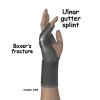Constantine
Forum Ride Along
- 6
- 0
- 1
We all know how to do proper CPR (hopefully), I am posting this thread to ask for feedback on a special circumstance:
A provider or bystander needs to modify his or her compressions due to a wrist or hand injury.
I recently suffered a Boxers Fracture to my right hand (compression fracture of the distal side of my 5th metacarpal/break of the bone in the hand below the pinky closer to the knuckle) and as a result have my right pinky and ring finger casted down to my wrist. This makes performing normal chest compressions somewhat difficult as pulling back my hand at the wrist and interlacing my fingers is not possible.
One solution that has been offered is for me to put my left (uninjured) hand in the center of the chest like one would normally do and grab my left forearm with my right hand so I can apply a compression by forcing down my body onto my left hand.
Thoughts or suggestions?
*Assume that mechanical CPR is not an immediate option
A provider or bystander needs to modify his or her compressions due to a wrist or hand injury.
I recently suffered a Boxers Fracture to my right hand (compression fracture of the distal side of my 5th metacarpal/break of the bone in the hand below the pinky closer to the knuckle) and as a result have my right pinky and ring finger casted down to my wrist. This makes performing normal chest compressions somewhat difficult as pulling back my hand at the wrist and interlacing my fingers is not possible.
One solution that has been offered is for me to put my left (uninjured) hand in the center of the chest like one would normally do and grab my left forearm with my right hand so I can apply a compression by forcing down my body onto my left hand.
Thoughts or suggestions?
*Assume that mechanical CPR is not an immediate option

